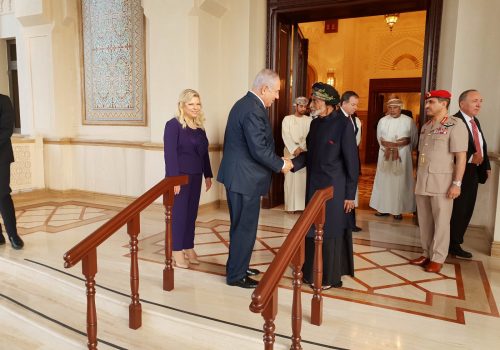May 8, 2020
Palestinians fight skepticism over whether they can stop annexation
As Israeli Prime Minister Benjamin Netanyahu seeks a green light from the White House to declare sovereignty over some thirty percent of the West Bank, Palestinians are scrambling to galvanize international opposition to the plan while battling skepticism that they can do anything to stop it. Given that Israel’s proposal for de-facto annexation of the Jordan Valley and most of the 130 West Bank settlements are a key part of the Trump administration’s “Peace to Prosperity” vision, the biggest challenge for policymakers, at this point, is to assess and prepare for the likely fallout.
Will there be violence or, perhaps, a new intifada uprising, as Israeli opponents of the annexation plans warn? Will the 1993 Oslo peace accords and all prior agreements with Israel be completely canceled, as Palestinian Authority President Mahmoud Abbas has threatened? Does it signal the final nail in the coffin of a two-state solution to the conflict? Or will Israel’s move pass quietly, anchoring the status quo while changing little in the daily routine of some 2.6 million Palestinians, who have been living on land under Israeli military occupation since the Six Day War in 1967?
Saeb Erekat, the most prominent Palestinian negotiator for about half that period, knows he can count, as always, on a wave of diplomatic protests against annexation from Arab and European governments. He also recognizes that lip service from foreign leaders in Paris, Cairo, and Riyadh will not be much help and that time is running out. Israel has designated July 1 as a start date for implementation. “What we’re telling them is that Netanyahu can survive statements of condemnation, but he needs to hear that there will be backlash and consequences as well,” Erekat said in what the Times of Israel described as a “fiery” interview.
Besides the rioting and suicide bombings that marked previous insurrections, those consequences for Israel could include the collapse of the Palestinian police and intelligence agencies—which have kept a lid on the militant group Hamas and others who espouse violent conflict in the West Bank most of the time —and the disbanding of the Palestinian Authority (PA). That would return responsibilities for collecting garbage, running schools and the general administering civilian life in Palestinian cities to Israel. This would cost an estimated $14.7 billion annually—an increase of ten percent in Israeli government spending at a time when its economy is reeling from the impact of COVID-19.
What is more, the prospect of deadly Israeli-Palestinian clashes being broadcast on screens around the world and any perceived threat in East Jerusalem to the al-Aqsa Mosque, the third most revered site in Islam, would probably slam the door on Israel’s rapprochement with Gulf Arab states, where years of government cooperation and business deals are becoming less secret.
Unilateral annexation would also damage Israel’s twenty-six-year-old peace treaty with Jordan, where the majority of people have Palestinian roots, and would complicate security cooperation with the Hashemite kingdom. Jordan’s King Abdullah has been warning for months that West Bank annexation would have “a major impact on the Israeli-Jordanian relationship” without going into specifics. While Amman has taken some limited diplomatic swipes at its neighbor, the king has never threatened to cut official ties with Israel, reflecting the fact that his financially-stunted nation receives a critical $1.7 billion in annual US aid.
The Arab League formally condemned West Bank annexation on April 30 in a meeting of foreign ministers from its twenty-two member-states, and declared that the Netanyahu plan “represents a new war crime” against the Palestinian people. The plan was denounced by eleven European ambassadors, who also came together in a video conference to warn Israel’s Foreign Ministry that annexation would be a violation of international law, carrying “grave consequences for regional stability and for Israel’s standing in the international arena.”
Neither Israel nor the US administration has blinked. Even as he faces trial this month on three criminal indictments, Netanyahu has made extending sovereignty in the West Bank a centerpiece of the new government he is trying to establish with former political rival Benny Gantz. While the coalition agreement states that the West Bank plan is contingent on approval by President Donald Trump, Secretary of State Mike Pompeo has indicated it should also have his support. US Ambassador David Friedman, once, the leading fundraiser for Israel’s Beit-El settlement, is heading a team of officials from both countries, who are consulting with mapping and security experts to tailor the plan to White House policy objectives.
Looking at how the world has acceded to Israel’s 1981 de-facto annexation of southern Syria’s Golan Heights, which was also captured in the 1967 war, the current build-up of international opposition is unlikely to block similar action in the West Bank. Erekat, the Palestinian negotiator, essentially, acknowledged that. Israel and the White House are betting that the Palestinians are punched out and won’t be able to mobilize much of a popular movement on the ground to stop it, said Riad Al Khouri, an Amman-based economist and political risk consultant at GeoEconomica.
“Abbas is going to foam at the mouth, he’s going to chew the carpet, he’s going to spend a whole day screaming his head off about the Palestinian holocaust and how this is the end, because he has to, because his public posture demands it,’’ said Khouri in an interview with this author. “Behind the scenes he’s going to be looking for a quid pro quo.”
Whether Palestinians get anything significant in exchange—in cash or other political currency—for letting Netanyahu’s West Bank plan proceed with minimal conflict, will show whether Trump can wring some value from his languishing $50 billion peace proposal. With US elections looming in November, the annexation drama over the next few months will give policymakers a clearer view of whether the current state of irritable calm will persist or a new wave of Israeli-Palestinian bloodshed is on the way.
Jonathan H. Ferziger is a writer and researcher who covered the Middle East for more than 20 years as a reporter for Bloomberg News. Follow him on Twitter: @jferziger.
Image: Israeli Prime Minister Benjamin Netanyahu stands at an overview of the Israeli settlement of Har Homa, located in an area of the Israeli-occupied West Bank, that Israel annexed to Jerusalem after the region's capture in the 1967 Middle East war, February 20, 2020. Debbie Hill/Pool via REUTERS/File Photo


